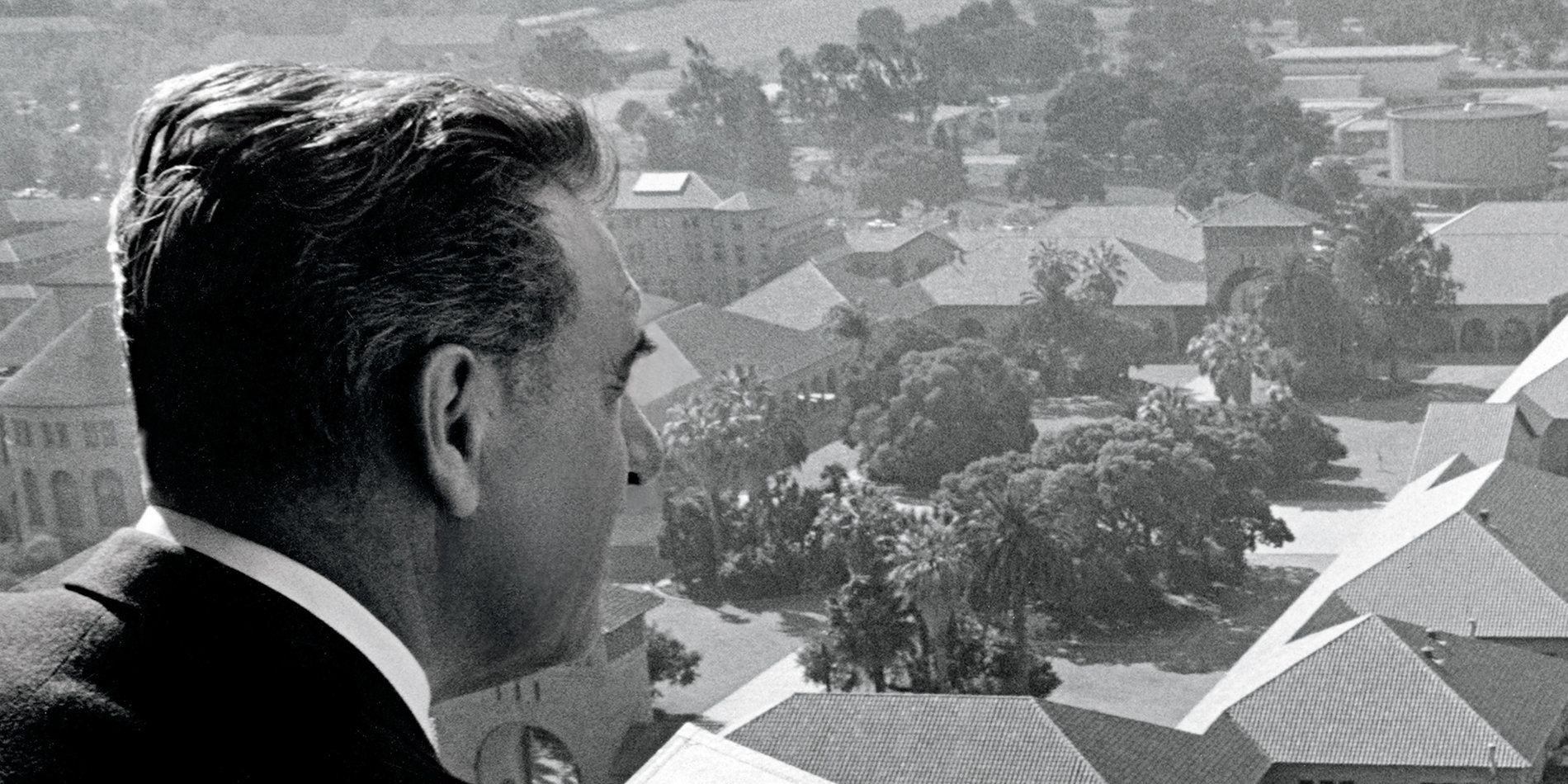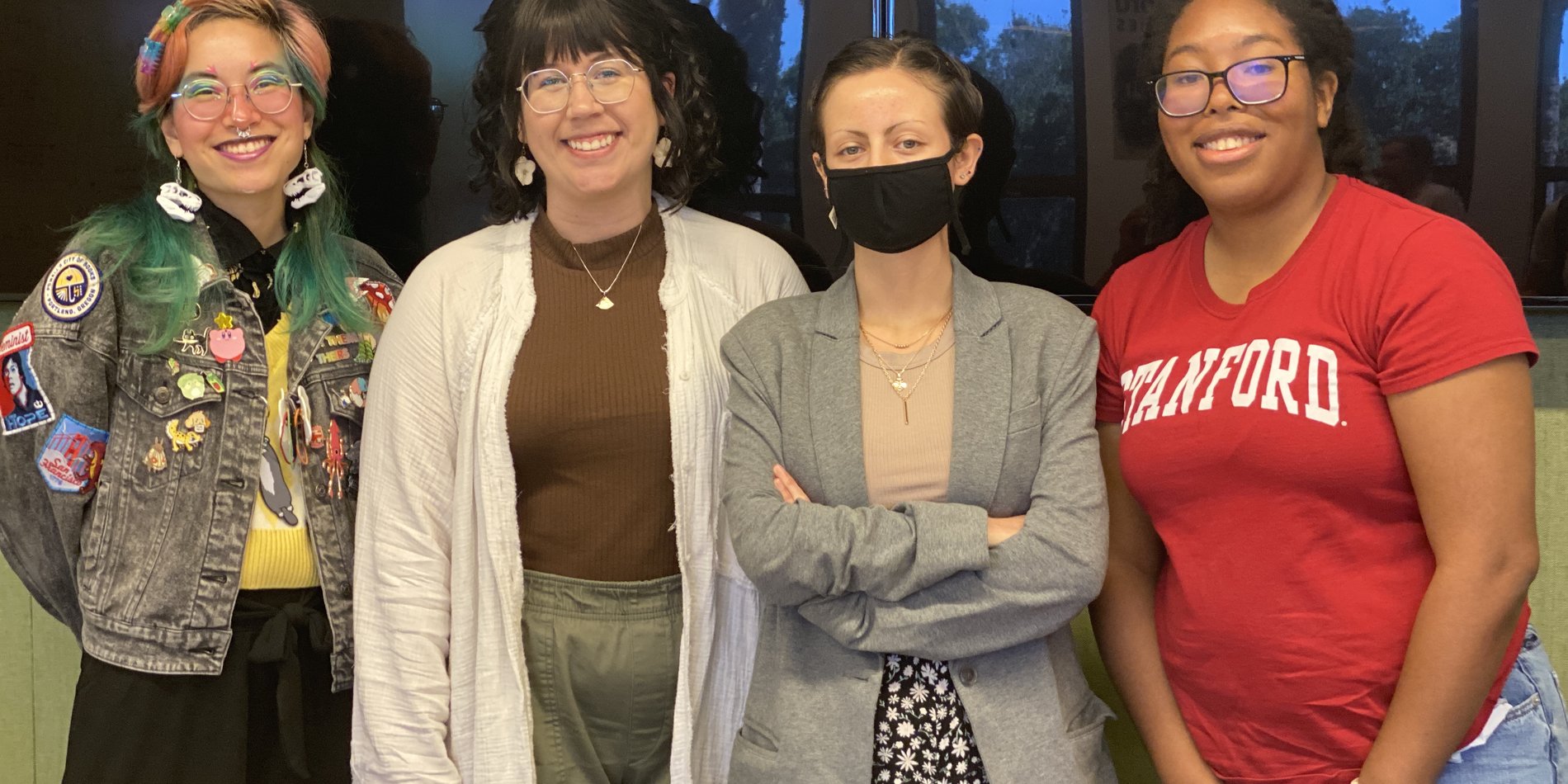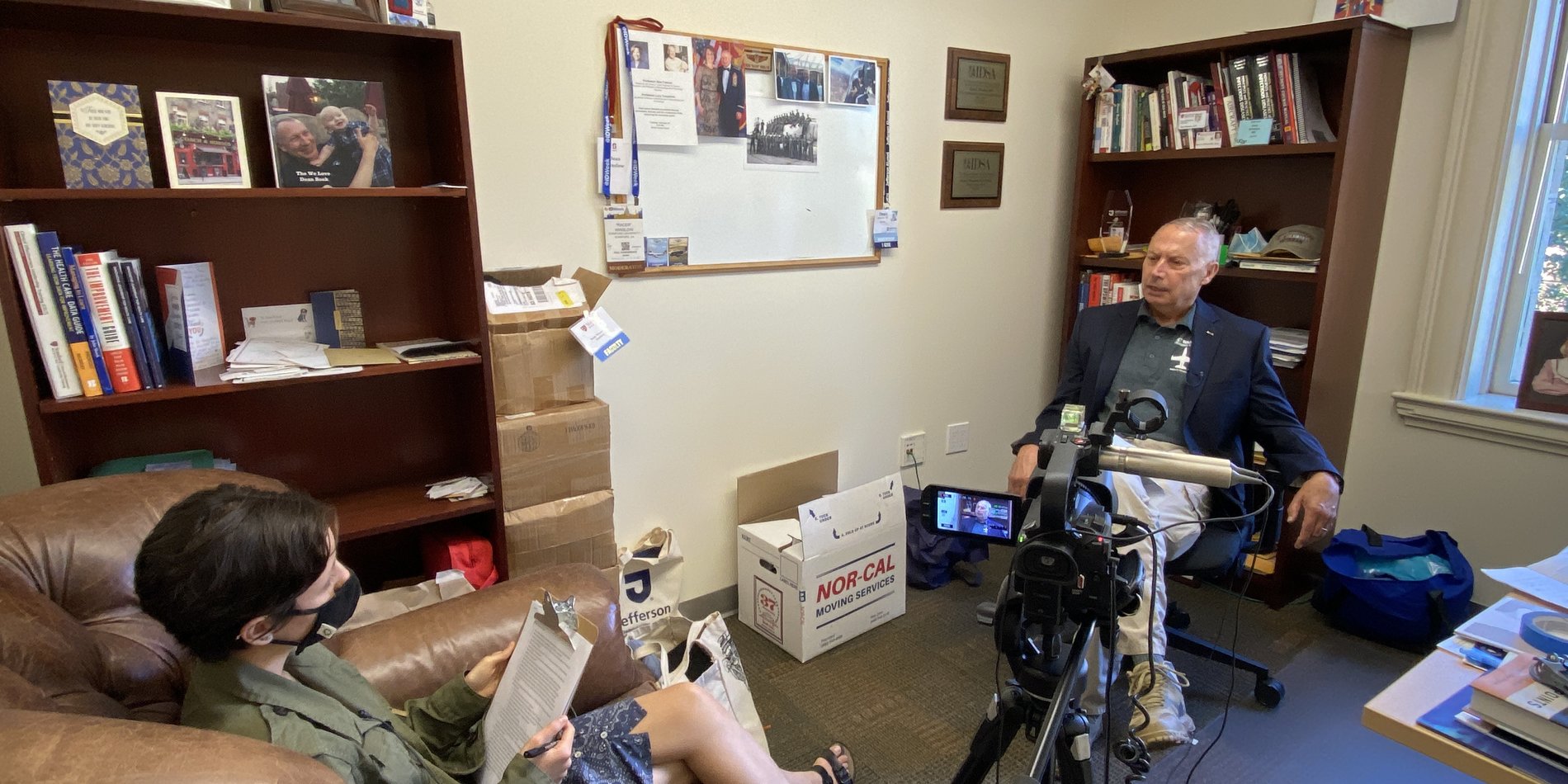Guest Blogger: Summer Intern Zoe Wallace

Intern Zoe Wallace setting up a camera for an interview to be conducted by Michele Marincovich (seated).
The most common question I’ve received this summer is “What are you up to?”
To this, I tell people, “I’m an intern at Stanford’s Oral History Program.”
Usually this prompts, “Oh, what’s that?”
The short and sweet answer: “I help interview Stanford professors and alumni, and do a lot of editing.”
Now this sounds simple, right? Too simple. It doesn’t capture just how much work goes into making oral history interviews available to the public, the main goal of this program. I mean, what’s the point of doing an interview with the creator of the internet if you’re just going to keep it to yourself?
If I were to ask a friend what they think the oral history program does, they might say “Interview, post, and done!” This describes two important steps, but it leaves out just how much preparation goes into each interview and the efforts interviewers make to grasp as much of their interviewee’s life as possible--their beginnings, their struggles, and their achievements, all of it. It leaves out what happens between turning off the recorder and being able to find the interview in the Searchworks catalog. It leaves out the process of transcription, the rounds of edits, and gathering everything needed so the interview can look neat and pretty online. Even the process of depositing the interview in the Stanford archives is a complex one.
Through my internship, I’ve found an appreciation for the process and immense respect for the amazing people I work with, who this year alone, have conducted over 14,000 minutes worth of interview time. That’s a lot to get through, so I’m honored to have been able to help.
I also now know the significance of oral history. I think most of the time we take stories for granted until they’re no longer available. For example, I had the honor of interviewing TAPS senior lecturer emerita Patricia Ryan Madson. Although I know next to nothing about theater and initially didn’t plan on taking any classes in it, listening to her talk on so many interesting topics like circumnavigating the world to compare performance across cultures, putting on a one woman show as Jane Stanford for 20 years, and how her classes have helped people both on stage and off has sparked an interest in me. I had no idea how much her life story would impact my own, but here I am including a crucial improv practice in almost everyday of my life: saying yes to every possible adventure. Such a motto instantly opened up so many doors to new people and experiences for me. Plus, the spontaneity learned from it is an important skill, a step to being able to think on your feet. Moral of the story: You never know what you might be able to learn from someone else.
Of course I’ve known Stanford’s faculty and staff are brilliant, but that’s another thing I find easy to take for granted. When taking classes at Stanford, half the time I’m only focused on this midterm I have to study for or this paper I have to write. I don’t think about how some professors have worked with former U.S. presidents, or how some are Nobel laureates, or how some helped to lead movements. I become ignorant of that privilege and I don’t take advantage of all the knowledge around me, but through this internship, I’ve been blown away by the accomplishments they’ve made. Moreover, the astonishment extends to Stanford alumni too, which includes people like Mae Jemison, Sterling K. Brown, Katie Ledecky--the list goes on--and it’s possible that they could be interviewed in the future, a detailed picture of their life could be in Stanford’s archives. And having access to history like that is such an important opportunity.
I realized that while we interview people associated with Stanford, their reach goes so far beyond. Learning about the history of Stanford is learning about the history of this country, and sometimes, even the world. For instance, Ricardo Muñoz shares his experience protesting the Vietnam War and Manjula Waldron describes her experiences as a woman of color in academia living in Australia during a time where immigrants of color were largely unwelcome.
“I remember doing [Anti-war] protests by the US embassy in Vienna, with the Stanford [Study Abroad] group. Then when we went to Rome, we actually got an audience with Pope Paul VI. I remember asking the Stanford group to write a letter asking the pope to excommunicate anybody who was taking part in the Vietnam War, which we actually gave the pope.” - Ricardo Muñoz (1972, Psychology)
“You were asking about how did we end up in Texas. I told you [that when we lived in Australia] there was a White Australia Policy, which meant every time I took the kids out to a park or something, they faced active discrimination. People would call them names. I’m saying, “Wait a minute, you can’t do that to my kids. Don’t you know I’m a professor in a university and everything?” I couldn’t put my résumé on my forehead, but I couldn’t be an Australian citizen.” - Manjula Waldron (PhD, 1971, Electrical Engineering)
Now I invite you to google the time periods/events mentioned above and you’ll probably find most sites offer a fancy timeline and a quick summary, which is great and can be helpful. Yet for me personally, when I’m learning about history, the stories that stick out to me the most aren’t the ones led by infographics, but the ones told with emotions. Oral histories offer that, they give more than just the quantitative; they provide an insight into the personal experience of the past, an idea of what contributions--good or bad--the past has made to the present, and where we might be headed.
With every interview, I learned something new--a new book to read, a new artist to admire, even a new field of things I suddenly want to try out. Some of my favorite finds from this summer include Charlotte Salomon, Simone de Beauvoir, and an improv class!
The same goes for present world events. I’ve had my mind blown hearing a new perspective of the same news I thought I’d read everything about. For example, John Rickford, a Stanford emeritus linguistics professor, talked about the Trayvon Martin case in his interview. He explained how the use of African American Vernacular English by Rachel Jeantel, a key witness, and the jury’s biases towards the dialect impacted the outcome of the case.
I’ve edited both transcripts and audio, skills that will serve me for years to come in my career. However, I think some of the most important lessons I’ve learned have been in the interviews themselves. Simple life advice like the excerpt below has changed my outlook in so many ways.
“There was a Facebook post that was recent that said, “I don’t want my children to follow in my footsteps. I want them to walk side by side with me and go further than I ever thought possible.” I think that’s really the crux of it. I don’t want them to do the same things I did. I want them to do better things. They were talking about passing the baton. I really feel I’m at that stage where it’s time to pass the baton. It’s always been my thing as a leader: Don’t hold everything to yourself. You need to have other people know what you’re doing and train them so that when you’re not there anymore, they can go forward.” - Margaret Hernandez (1975, Anthropology)
For me, I chose this internship because my dream is to become a writer or at least work in a publishing company, so naturally, my life revolves around stories. Hearing the life stories of so many amazing people helped me think about the stories I want to tell in the future and gave me an idea of what or who needs to be given a voice. I got everything I wished for out of this internship and more. I feel confident in my editing skills, and even my communication skills have improved. I’m also able to leave this summer with a deeper appreciation and understanding for oral histories. I hope you too, dear reader, have found a greater appreciation for oral history after reading my experience.
Zoe Wallace is a sophomore at Stanford planning to double major in comparative literature and comparative studies in race and ethnicity. She plans to minor in creative writing.
Originally posted in Special Collections Unbound by Emma Frothingham


